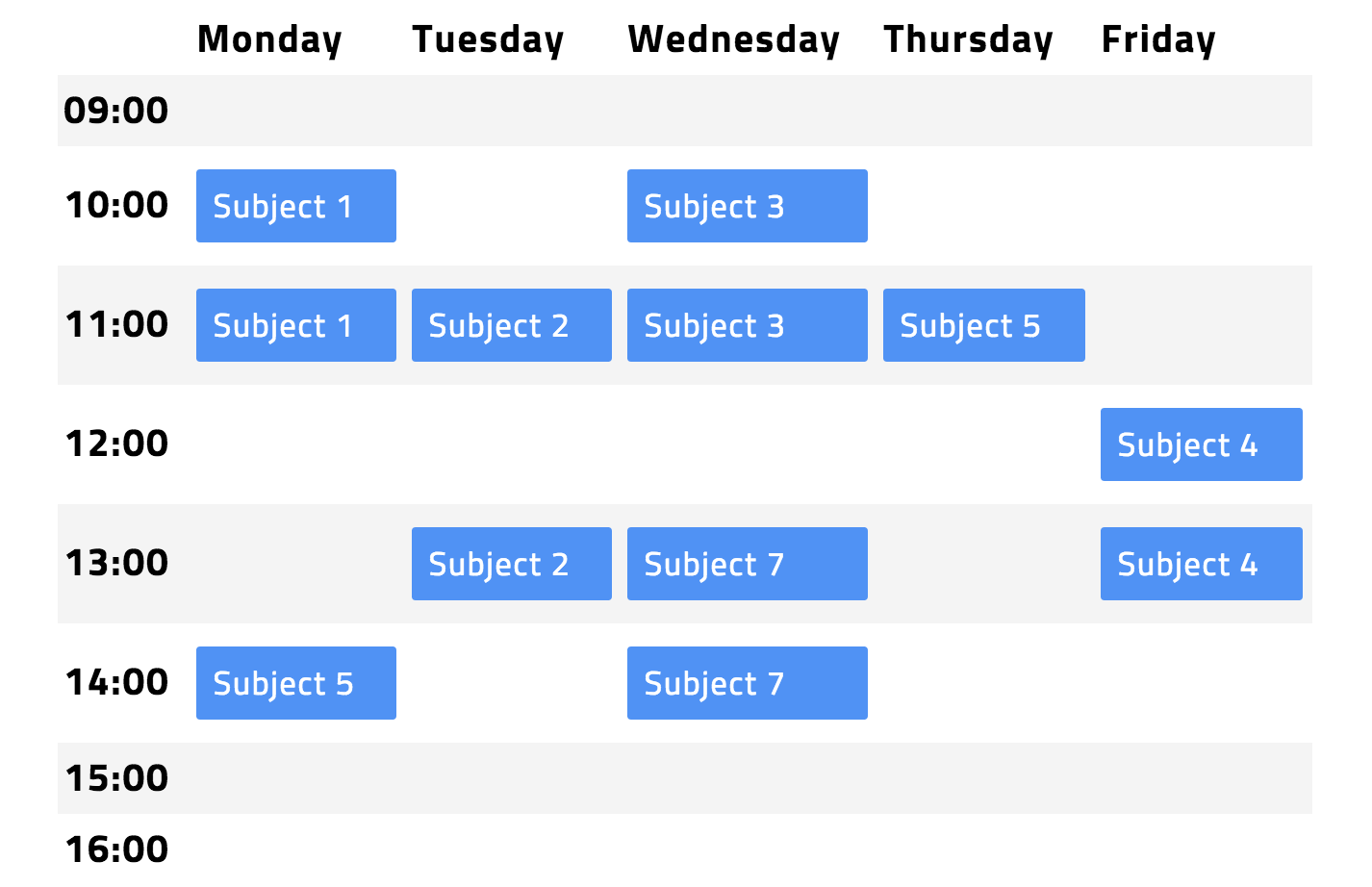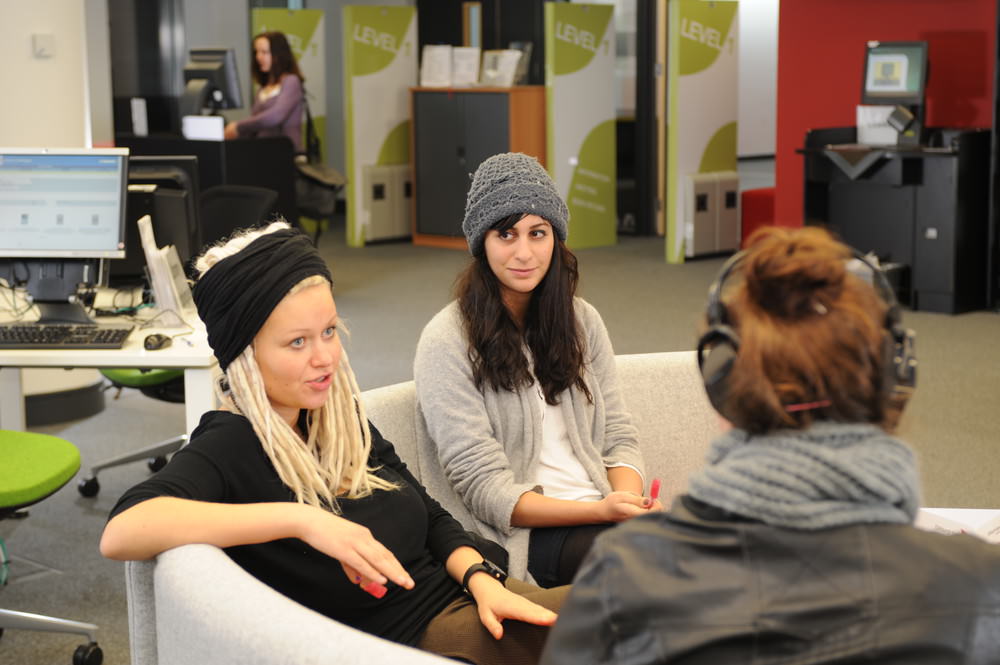What to expect
University is about more than just a qualification. It’s a life experience, and we want you to get the most out of it. You might be away from home for the first time, living independently, sharing a flat and managing your money.
In this section we cover the key skills and tools you will need to make all of that work.
A typical university week
You might have heard that university is like a part time job with just a few hours per week. There might be a grain of truth in that as far as teaching is concerned – but it’s far from the whole picture. There are a few different types of classes at university and also lots of independent study, so it’s really important to plan your week. Lets look at this in a bit more detail.
A university year
sept
Oct
Nov
Dec
Jan
Feb
Mar
Apr
May
Jun
Jul
Aug
sept

The academic year at Edinburgh Napier University runs from late September until mid September the following year, with the year split into three 15 week teaching blocks, or trimesters. Most students attend only the first two trimesters. The main exam weeks are in January, May and August.
Not every student follows the university calendar. You will probably know how your programme is structured, but if you’re unsure, look in your programme handbook. You can see the current academic calendar in more detail in your student diary, or on the University website.
University learning
Your programme will consist of a number of modules, each worth a certain number of credits - most are worth 20 credits. Modules are taught in a variety of different ways depending on the subject and stage in a programme, most including lectures, seminars, tutorials and online learning. Some include practical sessions and others have work placements.
Attending scheduled classes is only part of university study however. Your lecturer will give advice and point out key resources for your subject area, but after that, managing your studies is up to you. Students need good time management skills!
Lecture
In a lecture, information is presented by the lecturer often to a very large group of students. Students listen, take notes, and have the opportunity to ask questions, usually at the end, although some lectures are more interactive.
Tutorials and seminars
These tend to be smaller group sessions led by a tutor or facilitator, in which students participate in group discussion, or practice material covered in lectures. In a seminar, students are usually asked to prepare something in advance and may be asked to give a short presentation.
Workshops and practicals
A workshop is an interactive session led by a tutor or facilitator, where students explore a topic or skill. Students may work on tasks in small groups. Practical sessions give students the opportunity for hands-on practice and experimentation.
WebCT
This stands for Web Course Tools, and is used to support teaching and learning online. You’ll find out more about this from your module leaders and in your programme handbook.
The independent bit
At university, there is an emphasis on independent learning. A 20 credit module is allocated a notional 200 hours of study. Approximately 60 of these may be attendance, but the rest – at least 140 hours – is self-directed study.
You’ll need to keep track of all the details of your timetable, your lectures, seminars, workshops and coursework deadlines. You’ll need to make your own decisions about when to study, where to study, how long to study, and what to study when. There’s a lot to fit in, but it gets easier with time!
University timetable

A typical university timetable might look something like this. As you can see the amount of time in lectures and seminars is limited and this means plenty of time for independent study. Planning this into you week, along with all your other interests and pastimes, is key.
It’s a good idea to allocate self-directed study each week. If you work steadily during term, you’ll avoid panic later, and get better results.
Take some time to make sure you know what’s expected of you on your programme. And if in doubt, ask!
Living independently

There’s as good chance that coming to university will be the first time you’ve lived away from home. It’s also fairly likely that you will be sharing your accommodation with others. This is great and gives you a ready-made group of people to talk to, socialise with and share the ups and downs of uni life.
But, communal living can also have a few challenges. The trick is to deal with them quickly and sort out small niggles before they become big issues.
This is your 10 point survival guide to harmonious student living!
1) Cooking
Student food doesn’t have to be years of baked beans and day-old pizza. Eat well and you’ll feel better and perform better. You’ll also recover faster from (occasional) bouts of excess. There are a number of ways you can tackle cooking.
Solo – you might want to each take care of your own food and cooking. If you go down this route then you will need to agree sections of the fridge and cupboards, and label you stuff.
Group – You might decide to shop and cook together. Naturally you’ll need to agree the meals in advance and who is going to do what. Even if one of the group could give Jamie Oliver a run for his money they should still take a turn at washing up!
Rota – you could decide to take turns at cooking meals. This saves on waste and means you get a night off from the kitchen every now and again. As with group cooking you need to agree meals before you cook. No point proudly presenting your Beef Wellington masterpiece to a flat full of vegetarians.
In reality you might end up taking a mix of all these approaches. The key is to talk and agree in advance. If someone doesn’t want to get into the communal cook off then that’s their call.
2) Cleaning
Your own room is down to you but who keeps the common areas clean? It’s easy to slip into this routine over cleaning:
Everybody was sure that Somebody would do it. Anybody could have done it, but Nobody did it. Somebody got angry about that, because it was Everybody’s job.
Everybody thought Anybody could do it, but Nobody realized that Everybody wouldn’t do it. It ended up that Everybody blamed Somebody when Nobody did what Anybody could have.
Confused? The simple answer is work out what jobs need to be done and take a turn.
But remember, you might find that everybody has a different definition of cleaning. That’s where compromise and a bit of give and take comes in. The main thing is that everyone pitches in. A rota helps and if things get out of hand you could have a cleaning blitz and reward yourselves with a takeaway or a night out together. Some students even get a cleaner in to keep things under control. Depending on how many of you there are, and how much it costs, it could be a stress reducing option.
3) The Kitchen
I know we’ve already talked about cooking and cleaning but trust us – the kitchen deserves its own section. It’s the heart of the home and the scene of most of the drama! It’s a universal law that you will underestimate how much kitchen mess you make and overestimate how much cleaning and washing up you have done.
Who does what might depend on how you’re doing the cooking. If you’re all doing your own then you can simply do your own dishes – but you need to be quick as other people might be waiting for that pan. If you have a clean kitchen to start with it’s easier to keep it clean. A daily rota might also work well but it needs to be stuck to. Nail this and you have cracked the biggest challenge in shared living!
4) Shopping
There are some staples for the house that it’s worth getting together on. Things like toilet roll and washing up liquid. You could take it in turns to get them in or set up a kitty so that you never run short (which is better than getting caught short). Who gets them in and when is the next task. Plan ahead so that you’re shopping at the supermarket rather than the corner shop. If you have the space then bulk shopping makes for big savings.
5) Bills
A big one! There could be a lot to consider here such as rent, gas, electric, broadband, TV and more. This is something you really need to figure out at the start. Bad debts will hit your credit record and that’s not something you want. There are lots of ways to sort this out. A communal fund, shared account, taking a bill each. It all depends on how many of you there are and what bills you have. This is not like cleaning where someone slacks off a bit and you all grumble about them. You need to make sure everyone is paying their share so that you don’t get stuck bailing them out.
6) Privacy & Personal Space
Jean-Paul Sartre said ‘hell is other people’. Now that might seem a little harsh, and part of the fun at university is sharing your life and experiences with others, but we all need a bit of personal space from time to time. It’s really just a case of getting to know your flat mates and respecting their space (and getting them to respect yours). You don’t need to be ‘Sheldon Cooper’ obsessive but doors are for knocking on.
7) Guests
Is your flat going to be the kind of place where anyone can drop by – or will it be your communal fortress of solitude? Regardless of your general approach you and your flatmates are bound to have guests staying from time to time. Agree this in advance. Your cousin on the sofa for two nights is a good weekend. Your cousin on the sofa for two weeks is an imposition. Set ground rules in advance and tell people when you have guests coming. Three guests onto one sofa rarely works.
8) Compromise
This is the key to communal living. University is about more than just studying, but that is an important part of it! If your flatmates have lectures at 9am then they will appreciate you keeping the noise down the night before. Likewise if you do your best work late at night whilst listening to death metal then headphones are the way to go. Multiple people and one bathroom can be a challenge so don’t hog the shower. Give and take is the answer.
9) Pitching In (and tackling slackers)
No one wants to feel like the house nag – but on the other hand no one wants to feel that they are getting taken advantage of. Whether it’s paying the bills or cleaning the loo, everyone has the same responsibility. Set your ground rules at the start and you’re most of the way there. If things do get to a problem stage then get everyone together and work it out.
10) Communication
For any team to work well, people need to know what they should be doing and when. If something doesn’t work you figure out why and make a change. Your flat or house team is just the same. Get together at the start and agree how it will all work. You will make friends for life at uni and sharing a flat is one of the great experiences. Be open and honest at the start and keep talking. And enjoy it!
Money management

At university you may be managing your finances for the first time as well as getting to grips with your studies. It’s important to keep track of your spending so you can get the books and equipment you need, eat, and have some fun too, without hitting financial problems. This section is designed to help you do just that.
Everyone needs to plan their spending. This helps to keep you in control of your money and ensures you don’t get yourself into any financial difficulties. You’ll need to estimate your costs in advance so that you can plan a rough budget from the start. Then you’ll need to stick to it! If your budgeting doesn’t go to plan try to work out where you’re going wrong so you can make the changes you need.
This section gives an overview of the typical expenses you can expect at university, and some tips on how you can manage them. We also have a handy budget planner to keep you on track.
Your personal budget will vary depending on your course and your circumstances but being a student at university can be more expensive than you might think! And remember, before you start at university make sure you have a bank or building society account into which your student loan or bursary can be paid.
So, the big question is, what does it all cost?
The 8 Core Costs

Rent / Mortgage
For most students, the rent or mortgage is the main expense. Be careful if you plan to rent in the private sector. It is not unknown for 'landlords' to take deposits for properties which are not actually for rent.
In the UK, the cost of renting a room in a shared flat can be anywhere between £250 and £350 per month. The rent for student accommodation at Edinburgh Napier University is approximately £400 per month, including electricity heating and Internet access. If you live in a property where the residents are full-time students you are exempt from paying Council Tax.
Remember: You are only exempt from Council Tax if you live in a property where all the residents are full-time students.

Bills
Flat sharing is a fantastic experience, but shared bills can be a source of strain.
When you move in to a new flat, make a note of the gas and electricity meter readings.
Find out how the utility bills will be paid and, if necessary, organise a system to ensure everyone pays their share.
When each bill arrives check it against the meter reading.
If you don't get a bill contact the supplier immediately - they will catch up with you eventually and this may leave you with a huge bill you can't pay.
Tip: Keep a record of the full name and home address of all your flatmates so they can be contacted if anyone leaves before paying their share.

Books and equipment
Depending on the requirements of your course, costs for books and equipment can be very high.
Find out the cost of books and any special equipment you need as soon as you can, so that you can allow for this in your budget.
You don't have to buy everything on the reading list. Ask your lecturer which are the most essential for you to have.
Use the library as much as possible, and make good use of the online facilities at uni.
Shop around for the best stationery deals, and buy in bulk when you can.
Also, If you can, buy second hand or try sharing books or equipment with a friend.
In general it’s best to wait until your course has started before buying books and equipment. That way you can work out what you really need!
Tip: It's easy to spend a lot of money on printing. Try not to print out documents unless you really need to.

Telephone and Internet
Keeping in touch can be expensive.
Always shop around for the best deals to suit your needs.
Limit calls from your mobile phone as much as possible if they are not covered by your contract. Keep costs down by texting or using online communication apps along with free wifi.
If you're lucky, your flat may have broadband internet access. If not, you might want to consider setting this up, to share with flatmates.
Make good use of the computing facilities at univrsity. These should be equipped with all the software you need for your course.
Tip: Working in the open computing facilities at university can feel strange at first, but you soon get used to it.

Groceries
Keeping in touch can be expensive.
This includes food, cooking at home, eating out, snacks, coffees, toiletries and cleaning products.
Shop around for the best prices in your area.
Always look out for discounts and special offers - they can save you a fortune!
It's cheaper to buy your food, toiletries and cleaning products from a supermarket, rather than the corner shop.
Try to shop only once a week. Make a list before you go and don't shop when you're hungry - you'll be tempted to buy more than you need.
Learn good basic cooking skills. Fresh food is often cheaper than ready meals, and much healthier. And a healthy body means a healthy brain!
Avoid expensive takeaways and café meals - save these for special occasions.
Tip: Share some of your evening meals with flatmates, so you can buy and cook in bulk. (You also get to eat each other's star recipes.)

Social
This includes your social life, entertainments, sports, clubs, and other interests.
Be realistic about the entertainments you can afford, but look around for special offers too.
You might need to allow a little bit extra for social events and special occasions. Don't miss out!
Check out larger discount clothing stores to help you look good on a tight budget.
If you have a particular interest you want to develop while you're at university, for example music or sport, allocate part of your budget to it.
Tip: Give yourself a budget for going out, and try to stick to it!

Travel
This includes bus and train fares, travel passes, taxis and petrol.
Buy a bus pass or season ticket if you need to travel frequently by bus or train.
If you need to return home regularly to see your family and friends, remember to allow for this in your budget.
If you use a car, consider sharing the running costs with friends.
Use a bike if you can - its eco-friendly, and keeps you fit.
Remember: If your home is some distance away from university, take the cost of travel into account.

Insurance
It's well worth while having insurance. Think how much it would cost to replace everything you own!
If you live at home, check whether you are covered by your parents' household insurance.
If not, shop around for good deals on personal belongings insurance.
Some companies offer insurance deals designed specifically for students, which can be good value.
It's particularly important to get insurance if you travel abroad. It is worth it if things go wrong.
Tip: Always shop around for the best deals to suit your needs.
It can be quite challenging to budget if you haven't done it before, or if you have other commitments. But, by considering your needs in advance and planning carefully, you can find a way to get by.
- Plan from the start
- Set a realistic budget
- Keep track of your budget
- Make changes when necessary
- Then you can concentrate on your studies!
Top Tips:
Possible sources of income
Every student's situation is different, so think carefully about your own finances before you start university. As soon as you have applied for a place on a course you should check what financial support you may be entitled, and apply for it.
- Student loan
- Parental support
- Bursary or grant
- Scholarship/Trust
- Savings
- Bank overdraft
Possible sources of income might include:
Remember: By far the best way to supplement your income is through a part time job.
Student loans
UK students may be eligible for a Student Loan, paid for by the UK Government, to help cover the costs of your studies at university. You do not need to repay this loan until the April after you have completed your course, and are earning over a certain amount per year. After this, you will be expected to repay at 9% of your income, each year. If for any reason your income drops below the stipulated amount per year, you will not need to make any repayments until your income increases again.
More information: Student Loans Company
Supplementary grants
Some students may be eligible for supplementary grants to help with living costs. For example:
- Dependents Grant
- Lone Parent Grant
- Care Leavers’ Grant
- Disabled Student’s Allowance
- Young Student’s Bursary
- Independent Student’s Bursary
- More information: Student Awards Agency for Scotland
Edinburgh Napier University
Some Students may be eligible for extra support from the discretionary fund, the childcare fund or other university bursaries or grants. Please contact student funding for further information. If you do get into difficulties, you may be able to apply for help from Edinburgh Napier University’s Discretionary Fund
Earnings (and tax)
If you have a job as a student in the UK you may need to pay Income Tax, unless your earnings are very low. If you work during term time, Income Tax and National Insurance are deducted automatically from your earnings by the Pay As You Earn system (PAYE). If you are a full-time student and only work during your holidays, you may not need to pay tax through PAYE. Ask your employer to complete the student income tax exemption form P38(S).
More information: DirectGov - Working while you study
Useful links
Student Loans Company Provides loans and grants to students in colleges and universities across England, Northern Ireland, Scotland and Wales.
Student Awards Agency for Scotland Use this site if your home is in Scotland, or you are studying in Scotland, and you want to apply for tuition fees, loan or grants for a higher education course.
DirectGov Government information for UK students, including grants, Income Tax and National Insurance.
www.direct.gov.uk/en/EducationAndLearning
Money management tips:
- Find a good part-time job.
- Estimate your costs and plan a rough budget from the start.
- If your budget doesn't go to plan, work out where you need to make changes. Then make them!
- In general, wait until your course has started before buying books and equipment. That way you can work out what you really need.
- If you have a particular interest you want to develop while you're at uni, allocate part of your budget to it.
- Always look out for special offers, cut prices, and the best deals to suit your needs (but don't be tempted to buy anything you don't need)
- Where possible, share costs with friends, flatmates and fellow students.
- Learn some good basic cooking skills!
- Look into opening a student bank account with an interest free overdraft facility.
Remember: If you find yourself really struggling financially at university, don't hesitate to ask for advice.
University budget planner
Time management

Students often say that managing their workload is one of the most difficult things they experience when they first start at university. It is difficult, but you can develop good time management skills that will help you succeed.
So, what can you do to help plan your studies and work steadily? How can you meet all those deadlines and avoid mind-blanking panic?
- Organise your coursework and handouts as you go along. Don’t let big piles of paperwork accumulate
- Set aside regular study sessions every week so you can work steadily throughout the semester
- Develop good diary habits
- Write down deadlines as soon as you get them.
- Look at your diary on a daily basis
- Use task analysis to help you break down large tasks into smaller, manageable steps
- Use action planning to help you complete work. Attach deadlines to each step, and tick each one off as you complete it
- Make sure you know how much an assessment is worth in terms of %, so that you can put in the corresponding amount of effort
- Set yourself goals that are realistic and achievable
- If you’re finding it hard to get going set yourself one manageable task and DO IT. Don’t get hung up on things being perfect. Version one is better than version none
Top time management tips
Time management strategies
Time management is very important in becoming an independent learner. You need these skills to be successful at university because you have much more control over how you use your time, and over how you study.
But what can you do to help develop those crucial independent learning skills? Let’s look at some key strategies that might help. These include:
- time planning
- managing information
- managing large tasks
- meeting deadlines
This is all about finding strategies that work for you. After each section make a plan of actions that are useful and practical for you. We’ll give you some pointers to get you moving and you can refer back to the ‘top time management tips’ if you need more ideas.
Time planning
What might help you work steadily, so you don’t leave things until the last minute?
Many people find it difficult to work steadily. It’s all too easy to leave things to the last minute, but it’s much better to work at a steady rate – you’re less stressed, you learn more effectively, and you’ll get better marks. It helps to use your diary or calendar to write up a weekly timetable. Include your uni and your personal activities, and set aside regular study times each week (check out our timetable planner in ‘A typical university week’). You could also keep a ‘To do’ list. Remember it’s not enough to set a regular schedule, you need to stick to it!
The jargon
A short guide to some of the main terms you will be getting to grips with – and a few other things we thought might be useful.
Matriculation
Matriculation may sound complicated, but all it involves is some simple form filling and collecting your student (or matriculation) card. You will need this to prove you are student, and to join the University library.
Freshers
Freshers’ Fair, which is held during Freshers Week, is an opportunity for you to discover and sign up to the many and varied clubs and societies that are on offer to students.
PDT
Your Programme Leader or Personal Tutor (sometimes called PDT or Personal Development Tutor) will invite you to a meeting soon after you start. It is important that you go along, have a chat and get a chance to meet each other and discuss the course.
A trimester
A trimester is a 15-week teaching block. The academic year at Edinburgh Napier University runs from late September until mid September the following year, with the year split into three 15-week teaching blocks, or trimesters. Most undergraduate students only attend classes for the first two of these trimesters. However Nursing and Midwifery students also attend during Trimester 3.
A school
This is a division or branch of learning at a college or University. Edinburgh Napier University has six schools:
- School of Arts and Creative Industries
- School of Engineering and Built Environment
- School of Computing
- School of Life, Sport and Social Science
- School of Nursing, Midwifery and Social Care
- Edinburgh Napier University Business School
Do you know which school you'll be studying in?
Your University email
Your email address is made up of your matriculation number and @live.napier.ac.uk, e.g. 12345678@live.napier.ac.uk. You can find your matriculation number on your student (matriculation) card.
24 hour computing
The Jack Kilby Computing Centre at Merchiston Campus is a 500-seat computer lab, open 24 hours a day and seven days a week.
Moodle
Moodle is an online learning environment used to support teaching, learning and assessment. Modules make use of Moodle in a variety of different ways. Your programme or module leaders will explain how it is being used, and what is expected of you. If you are unsure about anything, ask your module leader.
A module
A module is a self-contained unit of learning designed to meet specific learning objectives, generally worth around 20 credits. A full time undergraduate programme consists of six modules in each academic year, planned to develop and build on your learning as you progress in your studies. Many programmes also include “elective” modules, to allow you to study an area of particular interest to you.
Plagiarism
Plagiarism means taking credit for the work done by others - whether purposely or inadvertently. It is viewed as a serious academic offence. To avoid plagiarism, you must ensure that all your work is your own, and that the work and ideas of others are clearly referenced.
A tutorial
This is a small class led by a tutor. Seminars and tutorials are both chances for students to discuss their ideas, or topics covered in class and coursework. In seminars, which are a little more formal than tutorials, students often prepare a short presentation to discuss with the group.
A dissertation
In a later year of your course you may be asked to complete a dissertation. A dissertation is a long written report of about 12,000 words, worth up to 40 credits. It gives you the opportunity to independently research an area of particular interest to you, and to develop and demonstrate your organisational, management and research skills.
Library Catalogue
The Library website gives students direct access to the online Library Catalogue, plus a variety of online databases and services, which you can access from anywhere, at any time. You can also access the catalogue from the Library on any Edinburgh Napier University campus.
C&IT Services
C&IT Services help with all aspects of the University’s communications and information technology, including telephones, computer hardware and software.
Programme Representatives
The Programme Representatives are students from every year of every course who are elected by other students to represent their classmates on staff and student committees.
ISAS
The Independent Student Advice Service (ISAS) is an advice service for individual students that is professional, confidential, non-judgmental and non-directive. It is part of the Students’ Association, not the University. The Students’ Association can help with a range of issues including funding, finance and budgeting, housing and tenancy rights, University regulations, employment, immigration, complaints, etc.
